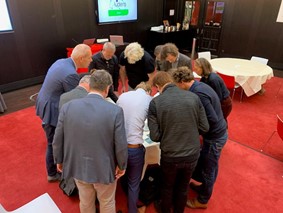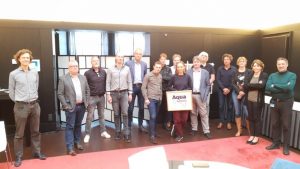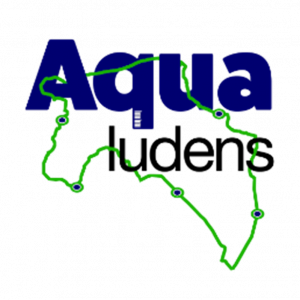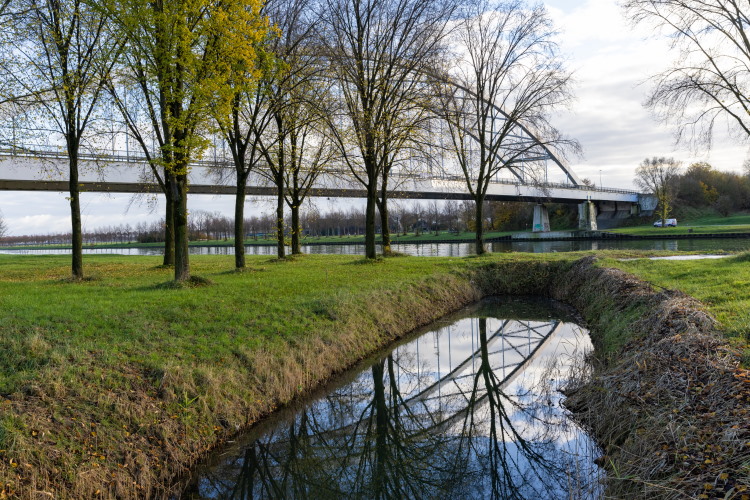Having sufficient freshwater available now and in the future for all functions – such as drinking water, industry, agriculture and nature – is not a matter of course. Especially not in a province like Groningen, which lacks large watercourses and has limited access to fresh groundwater. The development of a future-proof solution requires cooperation with all stakeholders. To support this cooperation, the Aqua ludens project was set up, which develops a set of instruments, including a serious game. Because the input of stakeholders is essential for the development of an effective toolkit, Aqua ludens has an advisory group in which a range of stakeholders are represented. On October 12, this group met for the first time, among other things, to play a serious game.
Water transition
The province of Groningen lacks large watercourses and fresh groundwater has limited availability. It is therefore not self-evident that, now and in the future, there will be sufficient freshwater available for all functions, such as drinking water, industry, agriculture and nature. Freshwater supply capacity is reaching its limits, while at the same time demand for water in the province of Groningen is expected to grow for example for industry, data centres and green hydrogen. In order to provide all functions with sufficient water, even in periods of drought, new solutions are needed – a water transition. A future-proof solution will have to be developed jointly with all stakeholders, the representatives of the water functions and related interests. The group of stakeholders in this issue is highly diverse and includes among others Waterbedrijf Groningen, Waterboards Noorderzijlvest and Hunze en Aa’s, Groningen Province, Municipalities Delfzijl and Het Hogeland, Groningen Sea Ports, agriculture, nature and industry. A joint process must be at the heart of this, whereby insight into and understanding of each other’s interests can be created.
Project Aqua ludens
This is why the Aqua ludens project is developing a set of instruments that can be used by all stakeholders (including those without specialist water knowledge) to provide insight into the importance of water, how the freshwater supply works and what the impact of choices is, both in terms of water availability and economic feasibility.
The project idea came about as a result of consultations between Waterbedrijf Groningen, WLN and KWR, and fits in with a need identified by these parties in relation to the Water Transition Groningen. Educational institution NHL Stenden and the British University of Exeter are contributing to the project from their knowledge of designing and developing serious games.
A serious game is central to the toolkit in order to support the water transition by:
- providing insight into the relationship between water supply and water demand, explained at a regional level in order to also be able to answer questions at a local level;
- making visible the impact of measures and investments, also by individual parties such as industries, and how choices made now can influence available choices in the future;
- provide insight into the impact of scenarios;
- to go through the ‘search process’ of the possible impact of the scenarios together with the stakeholders.
As the input of stakeholders is indispensable for the development of an effective toolkit, an advisory group was formed in which a range of stakeholders are represented.
First meeting of the advisory group
On 12 October, this group met for the first time. To get acquainted with serious gaming and to start the conversation about the challenges in Groningen, the participants briefly played a serious game. The focus was on 1) working together, 2) discovering what the real challenge is that you are working on and 3) understanding the context. During the discussion afterwards, it turned out that there are many lessons to be learned through such a game experience. Ivo Wenzler: “The game showed us that we often act from default behaviour, ‘I think I know what to do, so I just do it’. As a result, we don’t take the time to ask ourselves what the real problem is and for whom you are actually looking for a solution.”
In the discussion afterwards, the experiences of the game were related to the experiences of those involved in the province of Groningen and with the water transition. Elements that are important for the course of the process emerged from this discussion, such as:
- Hydrological challenge: Achieving a reliable supply of freshwater in the province is not only a challenge in dealing with drought, but also in properly coping with water surpluses and retaining water when it is available. In the discussion, participants mentioned the need for solutions at the system level, whereby smart combinations of functions can be sought. In addition, there is a need for a resilient system in the long term, within which this resilience can be realised on the basis of flexibility.
- Institutional challenge: The discussion during the first guidance group meeting and the exploratory interviews for the stakeholder analysis have already yielded new knowledge. It appears that the water shortages and the balance issues experienced by the various stakeholders are partly caused by external causes, such as droughts and increasing water demand. They are also caused by institutional challenges, such as the different scales at which stakeholders look at the challenge of freshwater availability (regional, national, international), the application of existing innovations and the assumptions and principles on which current choices for freshwater use are based (such as flushing toilets with drinking water). Finally, stakeholders share a need to combine various functions at institutional and societal level.
Conclusion: the lesson learnt from the serious game at the start of the meeting also applies here: it’s about what citizens and businesses want and what the water transition means to them.
Outlook
Based on the results of a stakeholder analysis, a system analysis and the outcome of the first meeting of the advisory group, a first conceptual design of the serious game will be worked on in the coming months. The advisory group will remain closely involved through regular meetings.

Participants in the advisory group play the serious game led by researchers from NHL Stenden University of Applied Sciences. The game offers a glimpse into the possibilities of serious gaming.

Group photo with all participants of the first advisory group meeting for the Aqua Ludens project in the Van Swinderen Huys in Groningen.

